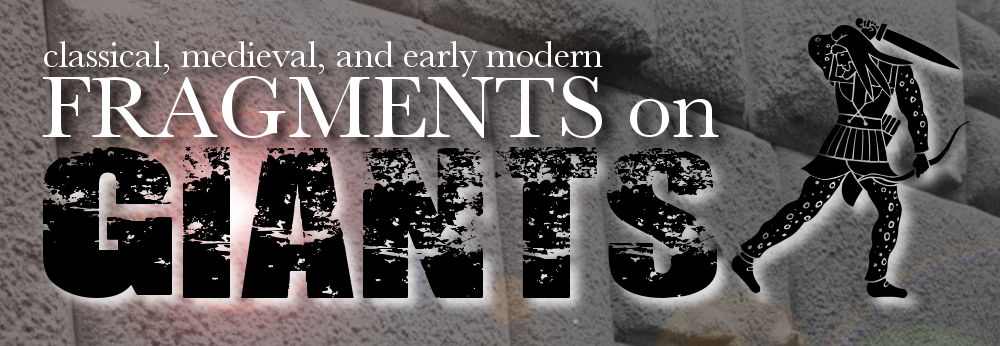This is an excerpt from the page Jason Colavito has set up on his site. You can check it out at - http://www.jasoncolavito.com/fragments-on-giants.html


This page will collect brief passages recording classical, medieval, and early modern authors' experiences with so-called giants. It's a work in progress, and I will be adding to it as time allows.
Herodotus, Histories 1.68 (c. 420 BCE)
Lichas then, being one of these, discovered it in Tegea by means both of fortune and ability. For as there were at that time dealings under truce with the men of Tegea, he had come to a forge there and was looking at iron being wrought; and he was in wonder as he saw that which was being done. The smith therefore, perceiving that he marvelled at it, ceased from his work and said: "Surely, thou stranger of Lacedemon, if thou hadst seen that which I once saw, thou wouldst have marvelled much, since now it falls out that thou dost marvel so greatly at the working of this iron; for I, desiring in this enclosure to make a well, lighted in my digging upon a coffin of seven cubits in length; and not believing that ever there had been men larger than those of the present day, I opened it, and I saw that the dead body was equal in length to the coffin: then after I had measured it, I filled in the earth over it again." He then thus told him of that which he had seen; and the other, having thought upon that which was told, conjectured that this was Orestes according to the saying of the Oracle, forming his conjecture in the following manner:--whereas he saw that the smith had two pairs of bellows, he concluded that these were the winds spoken of, and that the anvil and the hammer were the stroke and the stroke in return, and that the iron which was being wrought was the trouble laid upon trouble, making comparison by the thought that iron has been discovered for the evil of mankind. Having thus conjectured he came back to Sparta and declared the whole matter to the Lacedemonians; and they brought a charge against him on a fictitious pretext and drove him out into exile. So having come to Tegea, he told the smith of his evil fortune and endeavoured to hire from him the enclosure, but at first he would not allow him to have it: at length however Lichas persuaded him and he took up his abode there; and he dug up the grave and gathered together the bones and went with them away to Sparta. From that time, whenever they made trial of one another, the Lacedemonians had much the advantage in the war; and by now they had subdued to themselves the greater part of Peloponnesus besides.
Translated by George Macaulay.
Translated by George Macaulay.
Strabo, Geography 17.3.11 (c. 1st century BCE)
And Gabinius also, the Roman historian, does not abstain from telling marvellous stories of Maurusia; for example, he tells a story of a tomb of Antaeus near Lynx, and a skeleton sixty feet in length, which, he says, Sertorius exposed to view, and then covered again with earth.
Translated by H. L. Jones.
Translated by H. L. Jones.